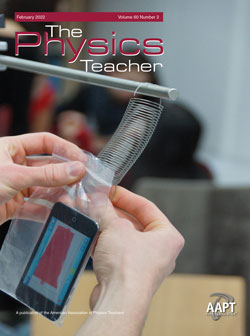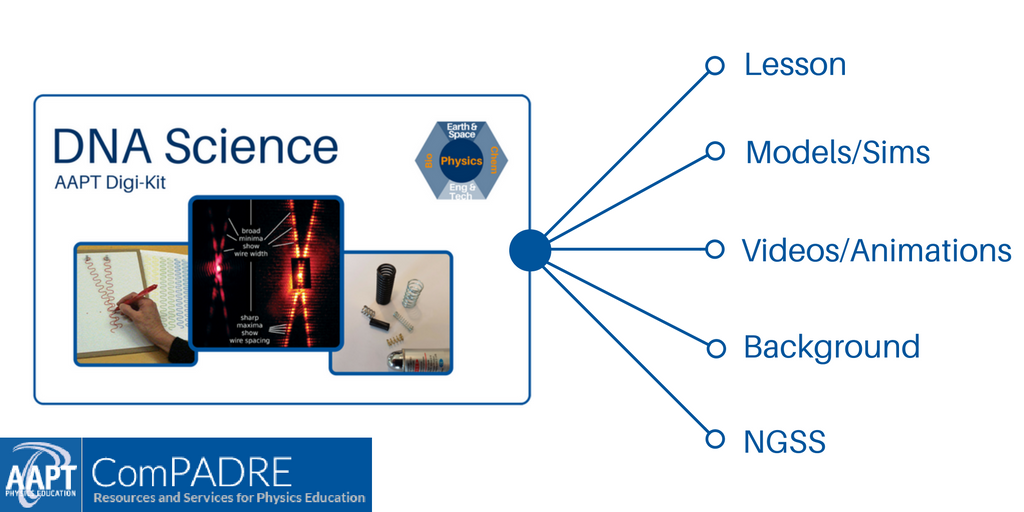
The Physics Teacher
February 2022
Volume 60 Issue 2
Experiments with mobile devices — A retrospective on 10 years of iPhysicsLabs
This month's cover features a student preparing to use a cell phone as the mass on the end of a spring, leveraging its built-in accelerometer and readily accessible software. This month, we celebrate 10 wonderful years of iPhysicsLabs column articles brought to the physics teaching community by Column Editors Jochen Kuhn and Patrik Vogt!
Columns
And the Survey Says..., Astronotes, Figuring Physics, For the New Teacher, Just Physics, iPhysicsLabs, Little Gems, Physics Challenge for Teachers and Students, Fermi Questions, Talkin' Physics, Technology In The Classroom, Tricks of the Trade, Visual Physics, and Websights.
LETTERS TO THE EDITOR
Numbers in physics teaching by C. H. Wörner. DOI: 10.1119/5.0055313
Eye-opening mirages by John A. Bloom. DOI: 10.1119/10.0009413
Improved centrifugal effect demonstration by Said Shakerin. DOI: 10.1119/5.0073541
Optics in the land of Serendip by Thomas B. Greenslade Jr. DOI: 10.1119/10.0009414
AWARDS
Homer Dodge Distinguished Service Citations. DOI: 10.1119/10.0009415
PAPERS
When the Quarter Jumps into a Cup (and When It Does Not) by Mateo Dutra, Álvaro Suárez, Martín Monteiro and Arturo Carlos Martí. DOI: The Physics Teacher 60, 87 (2022); https://doi.org/10.1119/5.0031589
Talking Is Thinking: Supporting Student Sense-Making Through Discourse and Assessment by Whitney Jackson, Lauren A. Simpson and Brooke A. Whitworth. DOI: 10.1119/5.0021977
Understanding the Law of Conservation of Momentum in One-Dimensional Collisions Between Two Objects Using the Velocity Space Approach by Kin Son Wong and Hang Wong. DOI: 10.1119/5.0024603
Making the Quantum Scattering of Fundamental Particles Accessible by James Day, Theresa Yu-Huan Liao, Char Hoyt and Oguzhan Can. DOI: 10.1119/5.0021481
Solar Eclipse and Cosmic Ray Flux by Tamar A. Dallal, Jacob M. Miller, Michelle Matten, Ezra Schur, Allen J. Sears, Clarissa Carr, Jacob Rosenberg, Nathan A. Unterman, Anthony Valsamis and Mark Adams. DOI: 10.1119/10.0009417
Measuring the Speed of Earth Around the Sun Using a Classroom-Built Radio Horn Telescope by Thaddeus Herman. DOI: 10.1119/5.0025845
Beyond the Classroom: Profiling Muon Flux in Relation to Overburden in Fermilab’s MINOS Tunnel by Eleanor Anne Winkler, Paul Graham, Nathan A. Unterman, Benjamin Grey, Jacob M. Miller, Max J. Miller, Allen J. Sears, Alex Bernat, Shoshana Frank, Joshua Simon, Shira K. Eliaser, Tom Blackmore, Emmanuelle Copeland, Marybeth Senser, Henry Seiden, Anthony Valsamis and Mark Adams, Tom Blackmore, Emmanuelle Copeland, Marybeth Senser, Henry Seiden, Anthony Valsamis and Mark Adams. DOI: 10.1119/5.0025659
Measurement of the Velocity of Sound Through Resonance in Air Columns as a Homemade Experiment by Zeyu Jason Niu and Duanbin Luo. DOI: 10.1119/5.0023835
Spectral Analysis of Musical Notes as a Source of Information About Musical Instruments by Oleksii Voronkin. DOI: 10.1119/10.0009418
Temporal Change of a Parallel Plate Capacitor’s Voltage after Dielectric Insertion by Youngmin Oh, Taehun Jang, Hyejin Ha and Sangho Sohn. DOI: 10.1119/10.0009419
Sign and Sense of an Induced Electric Current by a Nearby Moving Magnet by Roberto Rojas. DOI: 10.1119/10.0009420
Dynamic Applets for Teaching Physics by Thomas Lingefjärd and Guner Ahmet. DOI: 10.1119/10.0009421
Dynamics Experiments on the Touch Panel of a Tablet Computer by Yuki Aok and Kazushi Yawata. DOI: 10.1119/10.0009422
How to Use the Archimedes Paradox for Educational Purposes by Armand Le Noxaïc and Kamil Fadel. DOI: 10.1119/10.0009424
A Quantitative Experiment of Liquid Dispersion Using Merely a Partially Submerged Mirror and Sunlight by Cristiano M. B. Cordeiro and Eric Fujiwara. DOI: 10.1119/5.0022815
Polarimetry Measurement in a Physics Lab for Food Science Undergraduate Students by Ivan Cescon and Alberto Stefanel. DOI: 10.1119/10.0009425
Race and Physics Teaching Collection Resource
Race and Physics Teaching Continued May 2020-January 2021
DNA Science Lesson & Digi-Kit
Inspired by an article from The Physics Teacher, this multidisciplinary lesson and digital resource collection is based on How Rosalind Franklin Discovered the Helical Structure of DNA: Experiments in Diffraction (Braun, Tierney, & Schmitzer, 2011). Click the image to access this resource.


